|
|
|
Sort Order |
|
|
|
Items / Page
|
|
|
|
|
|
|
| Srl | Item |
| 1 |
ID:
145900
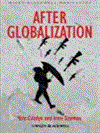

|
|
|
|
|
| Publication |
West Sussex, Wiley-Blackwell, 2011.
|
| Description |
x, 246p.pbk
|
| Standard Number |
9781118357521
|
|
|
|
|
|
|
|
|
|
|
|
Copies: C:1/I:0,R:0,Q:0
Circulation
| Accession# | Call# | Current Location | Status | Policy | Location |
| 058709 | 303.48/CAZ 058709 | Main | On Shelf | General | |
|
|
|
|
| 2 |
ID:
155790
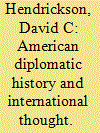

|
|
|
|
|
| Summary/Abstract |
This essay offers a constitutional perspective on the American encounter with the problem of international order. Its point of departure is the American Founding, a subject often invisible in both the history of international thought and contemporary International Relations theory. Although usually considered as an incident within the domestic politics of the United States, the Founding displays many key ideas that have subsequently played a vital role in both international political thought and IR theory. The purpose of this essay is to explore these ideas and to take account of their passage through time, up to and including the present day. Those ideas shine a light not only on how we organize our scholarly enterprises but also on the contemporary direction of US foreign policy and the larger question of world order.
|
|
|
|
|
|
|
|
|
|
|
|
|
|
|
|
| 3 |
ID:
069355
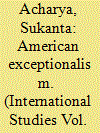

|
|
|
| 4 |
ID:
111812
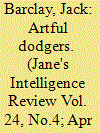

|
|
|
| 5 |
ID:
101841


|
|
|
|
|
| Publication |
2011.
|
| Summary/Abstract |
This essay argues that many modern discussions of Locke's political theory are unconsciously shaped by an imaginative picture of the world inherited from the past, on which authority and freedom are fundamentally antipathetic. The consequences of this picture may be seen in the distinction made customarily in Locke studies between the 'authoritarian' Locke of Two Tracts on Government, for whom authority descends from God, and the later, 'liberal,' Locke, for whom authority arises from the will and agreement of individuals, and felt in the emphases placed on consent and resistance in most interpretations of Lockean political thought. The essay examines the composition and contours of this picture and, by holding up a mirror to contemporary Locke scholarship, draws attention to some of the ways in which it unwittingly distorts Locke's thinking.
|
|
|
|
|
|
|
|
|
|
|
|
|
|
|
|
| 6 |
ID:
090897
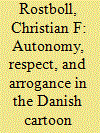

|
|
|
|
|
| Publication |
2009.
|
| Summary/Abstract |
Autonomy is increasingly rejected as a fundamental principle by liberal political theorists because it is regarded as incompatible with respect for diversity. This article seeks, via an analysis of the Danish cartoon controversy, to show that the relationship between autonomy and diversity is more complex than often posited. Particularly, it asks whether the autonomy defense of freedom of expression encourages disrespect for religious feelings. Autonomy leads to disrespect for diversity only when it is understood as a character ideal that must be promoted as an end in itself. If it by contrast is understood as something we should presume everyone possesses, it provides a strong basis for equal respect among people from diverse cultures. A Kantian conception of autonomy can justify the right to freedom of expression while it at the same time requires that we in the exercise of freedom of expression show respect for others as equals.
|
|
|
|
|
|
|
|
|
|
|
|
|
|
|
|
| 7 |
ID:
073988
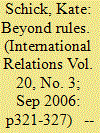

|
|
|
|
|
| Publication |
2006.
|
| Summary/Abstract |
This article critiques the liberalism that sustains human rights discourse as focused on rules to the detriment of focusing on the suffering of individuals. Too much human rights discourse has focused on the codification of human rights norms rather than the ways they are implemented and the failure to enforce them. International liberalism celebrates the advent of human rights whilst failing to confront the deeper structural dilemmas that the international political economic system generates. An engagement with critical theory leads to new ways of seeing human rights that might lead to alternative understandings of politics at the global level.
|
|
|
|
|
|
|
|
|
|
|
|
|
|
|
|
| 8 |
ID:
108514
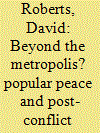

|
|
|
|
|
| Publication |
2011.
|
| Summary/Abstract |
The debate on peacebuilding is deadlocked. Leading scholars of 'fourth generation' peacebuilding, who take Liberalism to task for creating what they refer to as crises in peacebuilding, have themselves been challenged by those they criticise for over-stating Liberal failure and failing themselves to produce the goods in terms of an alternative. But behind this debate, it seems that both approaches are asking the same question: how can stable, legitimate, sustainable peace be engineered? This article engages critical theory with problem-solving social sciences. It proposes that the crises in orthodox post-conflict peacebuilding are genuine, but there are approaches that might put flesh on fourth generation concepts without bringing the Liberal edifice down, shifting the debate away from ontology and ideology and returning it to the people in whose name it is held.
|
|
|
|
|
|
|
|
|
|
|
|
|
|
|
|
| 9 |
ID:
077214
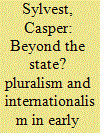

|
|
|
|
|
| Publication |
2007.
|
| Summary/Abstract |
The relationship between pluralism and internationalism is an interesting historical theme on the borderline between international relations and political theory. Intuitively the two ideologies seem to enjoy a close relationship, and at an abstract level they were both concerned with achieving political order with a minimum of central authority. However, the historical and theoretical interconnections between pluralism and (liberal) internationalism in Britain remain largely unexplored. This article attempts to fi ll this lacuna in intellectual history. Although both took shape within the confines of the same progressive intellectual agenda, the article strikes a cautious note about establishing too close a link between pluralism and internationalism, especially in the years following the Great War. This sceptical conclusion reflects not only the different preoccupations and changing nature of both pluralism and internationalism in the opening decades of the twentieth century, but also their complex theoretical relationship.
|
|
|
|
|
|
|
|
|
|
|
|
|
|
|
|
| 10 |
ID:
117879
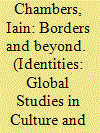

|
|
|
|
|
| Publication |
2013.
|
| Summary/Abstract |
This short article sets out to consider the limits of liberalism and its associated humanism in the light of reading Ash Amin's recent A Land of Strangers (2012). The terms of the debate are pushed beyond the idea of libealism as belonging to an exclusively European and autonomous formation. In a postcolonial take, liberalism is considered a conceptual field in which hegemonic processes and procedures of governmentality emerged in the historical moment that Europe seized the world and transformed it into what we call modernity.
|
|
|
|
|
|
|
|
|
|
|
|
|
|
|
|
| 11 |
ID:
163306
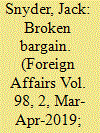

|
|
|
|
|
| Summary/Abstract |
Nationalism and nativism are roiling politics on every continent. With the election of President Donald Trump in the United States, the growing power of right-wing populist parties in Europe, and the ascent of strongmen in states such as China, the Philippines, and Turkey, liberals around the world are struggling to respond to populist nationalism. Today’s nationalists decry the “globalist” liberalism of international institutions. They attack liberal elites as sellouts who care more about foreigners than their fellow citizens. And they promise to put national, rather than global, interests first
|
|
|
|
|
|
|
|
|
|
|
|
|
|
|
|
| 12 |
ID:
178565
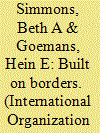

|
|
|
|
|
| Summary/Abstract |
The Liberal International Order is in crisis. While the symptoms are clear to many, the deep roots of this crisis remain obscured. We propose that the Liberal International Order is in tension with the older Sovereign Territorial Order, which is founded on territoriality and borders to create group identities, the territorial state, and the modern international system. The Liberal International Order, in contrast, privileges universality at the expense of groups and group rights. A recognition of this fundamental tension makes it possible to see that some crises that were thought to be unconnected have a common cause: the neglect of the coordinating power of borders. We sketch out new research agendas to show how this tension manifests itself in a broad range of phenomena of interest.
|
|
|
|
|
|
|
|
|
|
|
|
|
|
|
|
| 13 |
ID:
082679


|
|
|
|
|
| Publication |
2008.
|
| Summary/Abstract |
From Byron's death at Missolonghi in 1824 to D'Annunzio's capture of Fiume for Italy in 1919, the nationalism of universal liberalism and independence struggles changed, in literature as in politics, to cruel dictatorial fascism. Byron was followed by a series of idealistic fighter-poets and poet-martyrs for national freedom, but international tensions culminating in World War I exposed fully the intolerant, brutal side of nationalism. D'Annunzio, like Byron, both a major poet and charismatic war leader, was a key figure in transforming nineteenth-century democratic nationalism into twentieth-century dictatorial fascism. The poet's 'lyrical dictatorship' at Fiume (1919-20) inspired Mussolini's seizure of power in 1922, with far-reaching political consequences. The poet became the dangerous example of a Nietzschean Übermensch, above common morality, predatory and morally irresponsible. This article shows how the meaning of nationalism was partly determined and transformed by poets, illustrating their role as 'unacknowledged legislators of the world'
|
|
|
|
|
|
|
|
|
|
|
|
|
|
|
|
| 14 |
ID:
055457
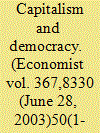

|
|
|
| 15 |
ID:
178549
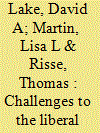

|
|
|
|
|
| Summary/Abstract |
As International Organization commemorates its seventy-fifth anniversary, the Liberal International Order (LIO) that authors in this journal have long analyzed is under challenge, perhaps as never before. The articles in this issue explore the nature of these challenges by examining how the Westphalian order and the LIO have co-constituted one another over time; how both political and economic dynamics internal to the LIO threaten its core aspects; and how external threats combine with these internal dynamics to render the LIO more fragile than ever before. This introduction begins by defining and clarifying what is “liberal,” “international,” and “orderly” about the LIO. It then discusses some central challenges to the LIO, illustrated by the contributors to this issue as well as other sources. Finally, we reflect on the analytical lessons we have learned—or should learn—as the study of the LIO, represented by scholarship in International Organization, has sometimes overlooked or marginalized dynamics that now appear central to the functioning, and dysfunction, of the order itself.
|
|
|
|
|
|
|
|
|
|
|
|
|
|
|
|
| 16 |
ID:
176216
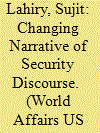

|
|
|
|
|
| Summary/Abstract |
Security discourse has radically changed over the years, especially since the Post–Cold War period. The traditional concept focuses on state security and national security, and is essentially based on realist and neo-realist paradigms. However, in 1994, the United Nations Human Development Report for the first time elaborated the notion of human security and the associated Human Development Index (HDI). Human security advocates a people-centric approach to security. The two foundational principles on which human security is based are “freedom from fear” and “freedom from want.” I evaluate the notions of state security versus human security and examine how South Asian countries have fared regarding the human security indices. I conclude that, despite advances in some areas, various HDI parameters show that the human security record is still rather dismal in South Asia. There remains a critical need to improve it.
|
|
|
|
|
|
|
|
|
|
|
|
|
|
|
|
| 17 |
ID:
117179
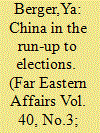

|
|
|
| 18 |
ID:
158256
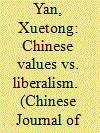

|
|
|
|
|
| Summary/Abstract |
The liberal hegemony of the United States is fading and faces the growing challenges from other ideologies including those from China. The question is which Chinese political values will guide China’s policies in shaping the future international normative order. There are three political values compete with each other in China, Marxism, economic pragmatism, and Chinese traditional values. The Chinese government tries to combine Marxism with Chinese traditional values. Such effort, however, may find its difficulties in achieving the assigned targets. Although the US liberalism is losing influence, it is still the most influential global ideology and will not be abandoned overnight. China may find that it is possible to shape the international order by combining some Chinese traditional values with selected liberalist values, such as benevolence, righteousness and rites with equality, democracy and freedom, respectively. The combination can produce a set of modern values of wangdao (humane authority), such as fairness, justice, and civility. The new norms under the guidance of these values could be acceptable to most countries because of their universality, and will bring about a more peaceful international order than what we have today.
|
|
|
|
|
|
|
|
|
|
|
|
|
|
|
|
| 19 |
ID:
132980
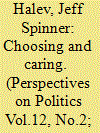

|
|
|
|
|
| Publication |
2014.
|
| Summary/Abstract |
Choice and markets have always been central to liberalism. Liberals wants people to choose their occupation, their partners, and what goods to buy. All liberals agree that making choices is central to the autonomous life. But the scope and conditions of choice quickly becomes controversial among liberals, as the four books under review reveal. Joan Tronto and Michael Sandel worry about the spread of market thinking to all other spheres of life, John Tomasi argues that too many contemporary liberals underestimate the importance of economic liberty, while Sarah Conly argues that we have a large swath of empirical evidence to question the idea that individuals can readily make correct rational decisions. Conly is not against individual autonomy, but she urges us to recognize autonomy's limitations. While political theorists are often reluctant to think about policy, doing so is certainly a virtue when the topic is markets and choice; one of the strengths of Conly's and Tronto's books is their willingness to apply their arguments to specific policy realms.
|
|
|
|
|
|
|
|
|
|
|
|
|
|
|
|
| 20 |
ID:
123735
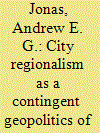

|
|
|
|
|
| Publication |
2013.
|
| Summary/Abstract |
This paper argues that it is intellectually unsustainable to separate the new economic geography of city-regionalism from its geopolitical context. The neo-liberal competition state is centrally implicated in how the city-region scale is politically orchestrated so as to bolster international competitiveness. Yet the diversity of national and sub-national forms of city-regionalism cannot be attributed to economic development considerations separately from ongoing struggles around the collective provision of social and physical infrastructure. Drawing upon selected examples from the United States, the paper demonstrates how city-regionalism expresses the contingent geopolitics of capitalism. Its overall aim is to advance theoretical knowledge both of the internal political geography of the competition state and of its external territorial relations.
|
|
|
|
|
|
|
|
|
|
|
|
|
|
|
|
|
|
|
|
|